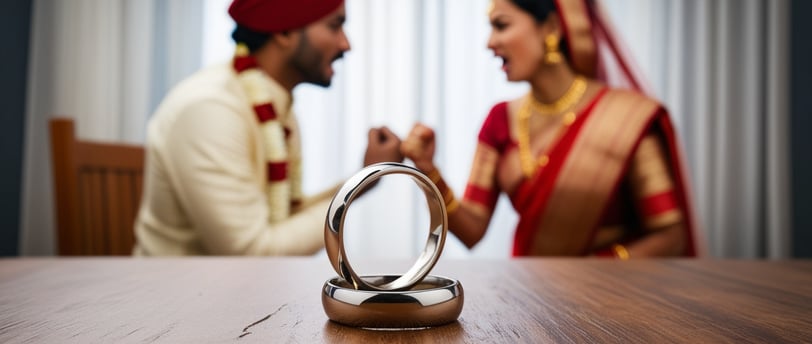Does Wife Get 50% of Husband's Property After Divorce? Debunking the Myth
BLOGS
10/26/20243 min read


The myth of wives automatically getting half of their husband's property after divorce has created panic among many Indian men. If you're worried about losing your hard-earned assets or ancestral property in divorce, this guide will help you understand the reality of property division under Indian law.
Debunking the 50% Myth
"Will I lose half of everything I own?" This question haunts many Indian men facing divorce. The answer, fortunately, is no. Unlike some Western countries, Indian law doesn't recognize the concept of automatic 50-50 division of property after divorce. The Supreme Court has repeatedly emphasized this point, most recently in Naveen Kohli vs Neelu Kohli (2021), stating that no fixed formula exists for property division.
Understanding Your Protected Properties
Your ancestral property, assets inherited from parents, and properties purchased before marriage are typically safe from divorce settlements. The Supreme Court has consistently held that a wife cannot claim rights over properties that belonged to her husband before marriage or those inherited by him, even during the marriage.
When Properties Can Be Divided
Property division becomes more complex when dealing with assets acquired during marriage. However, even here, there's no automatic split. Courts examine various factors, including direct financial contributions, the source of funds, and the nature of property ownership.
A Delhi businessman recently won his case when his wife demanded 50% of all his properties. The court ruled that she was only entitled to a share in the apartment they bought together during marriage, protecting his pre-marriage investments and family inheritance.
The Role of Contribution
Modern Indian courts recognize both financial and non-financial contributions to the marriage. However, this doesn't translate to an automatic share in properties. The Bombay High Court recently clarified that while a homemaker's contribution is valuable, it doesn't automatically entitle her to a share in every property owned by the husband.
Protecting Your Assets
Prevention is better than cure when it comes to property disputes during divorce. Maintaining clear documentation of property ownership, purchase sources, and inheritance papers can save you countless hours of legal battles. Remember, courts appreciate transparency and proper documentation.
Property Types and Their Treatment
Your ancestral home, properties inherited from family, and assets purchased before marriage are your personal properties. The law recognizes and protects your ownership rights over these assets. Even for properties acquired during marriage, courts look for direct contributions or joint ownership rather than assuming automatic division.
Recent Legal Developments
The legal landscape continues to evolve in favor of fairness rather than arbitrary division. In 2023, the Karnataka High Court emphasized that a wife's claim to property must be substantiated with evidence of contribution, either financial or otherwise. This judgment further reinforced that marriage alone doesn't create property rights.
The Path Forward
If you're facing divorce proceedings, focus on establishing clear ownership trails for your properties. Courts appreciate honesty and transparency. Document everything - from inheritance papers to purchase receipts. Keep records of fund sources and maintain clear timelines of property acquisition.
Understanding Genuine Claims
While protecting your rights is important, courts do recognize legitimate claims. If your wife has contributed financially to property purchase or if you've bought property jointly during marriage, these assets might be subject to division. However, the division would be based on contribution rather than an arbitrary percentage.
Professional Guidance Matters
Every divorce case is unique, with its own complexities regarding property division. While understanding your rights is crucial, having professional legal guidance can make a significant difference. An experienced lawyer can help protect your property rights while ensuring compliance with legal requirements.
[Worried about your property rights during divorce? Our experienced legal team can help protect your assets. Schedule a consultation now →]
Key Takeaways
Remember, marriage in India doesn't automatically make your wife a co-owner of your properties. Courts protect your rights to ancestral property, pre-marriage assets, and inherited wealth. Even for properties acquired during marriage, division depends on proven contribution rather than arbitrary rules.
The key lies in maintaining proper documentation and seeking timely legal guidance. With the right approach and understanding, you can protect your property rights while ensuring a fair divorce settlement.
